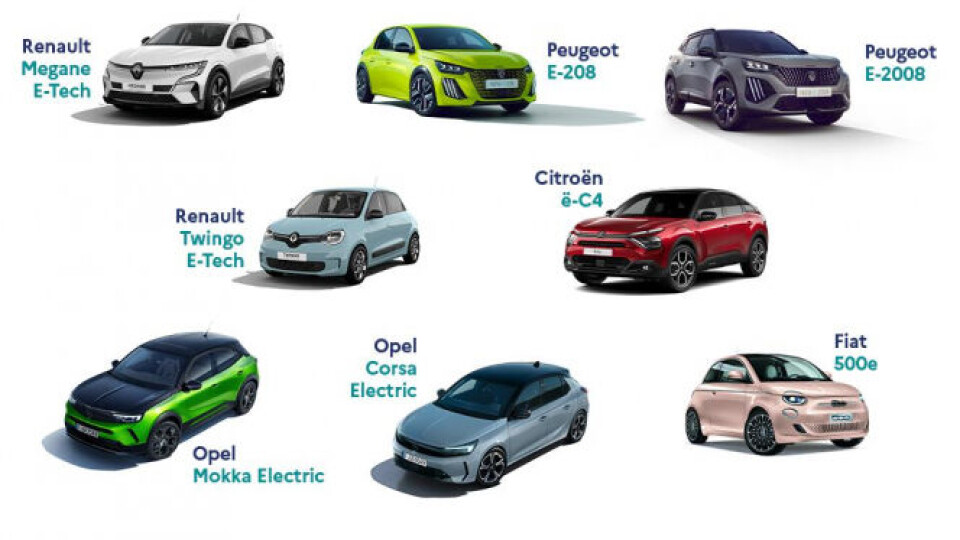-
Is it ever OK to ask your colleagues what they earn in France?
Has a shift in attitudes lead more French employees to openly discussing their earnings?
-
What to consider if you lend money to family members in France
Having recourse to legal protection can be useful even when dealing with those close to you
-
Why are gas tariffs so high in France and will this last?
One householder has reported an annual gas bill rise of €650
Scheme to rent electric car for €100-a-month launches in France
We look at the government's social leasing scheme, explain who it is for, and how to apply

Electric cars are set to become available for just €100 per month in France, as the government’s pledge to make the vehicles more affordable launches - with the first vehicles to be delivered in January 2024.
President Emmanuel Macron had pledged to roll out the scheme before Christmas.
He said it was part of his plans to create 'écologie à la française (French-style eco-friendliness)’, and he officially ‘launched’ the scheme today (December 14) in a video posted on X (formerly Twitter).
L’écologie à la française, c’est cela : dès janvier, les premiers modèles de voitures électriques en leasing seront disponibles à 100 euros par mois.
→ https://t.co/h8HFYCE6Uf pic.twitter.com/NmAX2FS0gJ
— Emmanuel Macron (@EmmanuelMacron) December 14, 2023
“The aim is to help you buy electric vehicles that are produced in our country instead,” he said. “As you know, we want to continue to reduce our CO2 emissions…And one of the things we're going to do is replace our [combustion] vehicles with electric vehicles…
“We're going to produce more and more electric vehicles [and] electric batteries in France over the coming months and years. I made a commitment during the presidential campaign, in 2022. I wanted to announce to you that from January 1, the €100-a-month leasing system will be introduced.
“You could be among the first French people to have access to this leasing for electric vehicles,” he said.
Who can use the scheme?
The ‘social leasing’ scheme is intended for the least well-off 50% of households, with a taxable income per household unit (one per adult, half per child) of less than €15,400 (as shown on your last tax return). It will allow drivers to lease an electric vehicle with low monthly payments.
Drivers will also need to be ‘major users (gros rouleurs)’ who drive more than 8,000 km per year, or live more than 15 km away from their workplace, to which they need to drive using their own car.
You must also be over 18 and can prove that you live in France.
Around 4 million to 5 million people are expected to be eligible for the scheme.
Read more: Lease an electric car in France for €100 a month - who can benefit?
How do you apply for the scheme?
People can determine their eligibility on the plan’s official website.
From January 1, they can make their order there too, with the first vehicles set to be delivered in the same month.
Which vehicles are included?
Image: Ecologie.gouv.fr/mon-leasing-electrique

Only vehicles that are on the official list will be eligible for leasing. The government is planning to make 20,000 vehicles available initially, and quadruple that number by 2025.
These include:
-
Five Renault models, including the electric versions of the classic Twingo, Megane, and Scenic
-
24 models from the Stellantis group, including the Peugeot 208, and the Citroën e-C4
-
The Tesla Model Y
In contrast, one of the most-affordable electric cars, the Dacia Spring - made in China - is not on the list.
Eligible vehicles must also:
-
Achieve the minimum environmental score
-
Cost less than or equal to €47,000 (purchase price)
-
Weigh less or equal to 2,400 kg
Some will also be able to lease a second-hand model, or one that has been retrofitted as an electric vehicle. These must still have been registered for the first time - or converted - within the last three and a half years.
How much does it cost?
Recipients will pay on average €100 per month, but smaller vehicles will cost less, and larger vehicles more (up to €150/month). The contract will last at least three years, and will be renewable, with the option to buy the car at the end.
Car insurance, charging, and other associated costs are at the driver’s own expense.
However, one advantage of the scheme is that the first month’s payment will be the same as the other months, because the government will subsidise the rest of the cost. This means that drivers will avoid the large first payment that is often required for vehicle leasing.
People who sign up will be able to cancel their contract within the first 14 days, as long as their vehicle has not yet been delivered. Participants will also be able to cancel their plan free of charge in case of disablement, loss of income, or death of the named driver.
Drivers will also be able to drive 12,000 km per year without any extra charges.
Related articles
How electric car grants are changing in France
Renault to launch electric car costing less than €20,000
Driving in France: Is it time to switch to an electric car?























